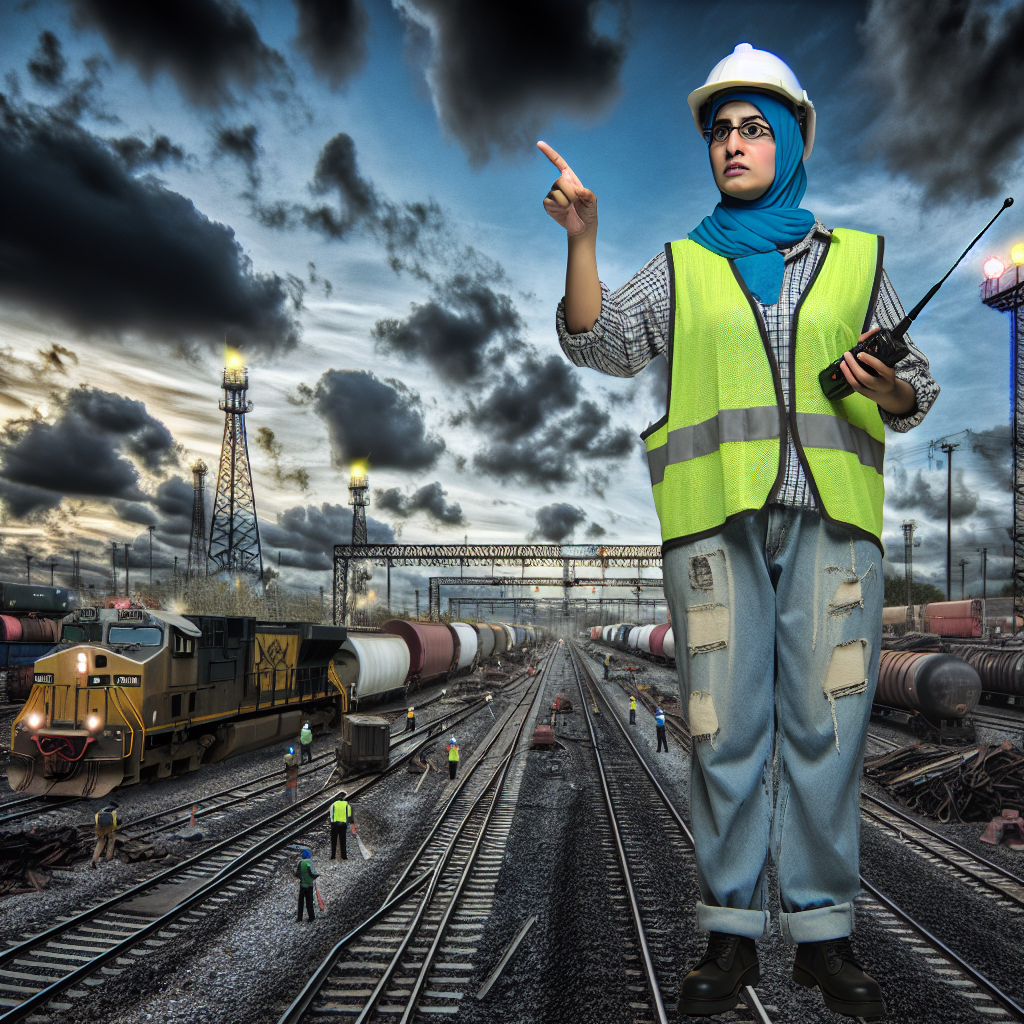Introduction
Rail yard engineers are responsible for moving trains in and out of the rail yard efficiently.
In emergencies, their role becomes crucial as they must quickly assess the situation and take decisive action.
Their expertise in operating locomotives and knowledge of rail yard operations are vital in handling emergencies effectively.
Rail yard engineers are trained to respond to various emergency scenarios such as derailments, mechanical failures, and fires.
During emergencies, rail yard engineers must act swiftly to ensure the safety of personnel and prevent further damage.
Clear communication with other crew members and emergency responders is key in coordinating a response to the situation.
Their quick thinking and problem-solving skills are put to the test in high-pressure situations.
Rail yard engineers must be prepared to implement emergency protocols and make split-second decisions to mitigate risks.
Their ability to remain calm under pressure and prioritize safety is paramount in emergency situations.
Their role as first responders in rail yard emergencies showcases their dedication to ensuring the well-being of everyone involved.
Training and Preparation
Rail yard engineers go through rigorous training to ensure they are prepared for any situation that may arise while on the job.
The training typically includes a combination of classroom instruction and hands-on experience.
Overview of the training required to become a rail yard engineer
One crucial aspect of a rail yard engineer’s training is learning how to respond to emergencies quickly and effectively.
Specialized courses are designed to equip engineers with the knowledge and skills needed to handle a wide range of emergency situations.
Specialized courses on emergency response procedures
In addition to classroom instruction, rail yard engineers participate in simulations and drills to practice responding to various emergency scenarios.
These activities help engineers develop the muscle memory needed to act quickly and decisively in high-stress situations.
During these simulations, engineers are put through their paces, dealing with everything from derailments to fires to hazardous material spills.
This hands-on training is invaluable in preparing engineers for the unexpected challenges they may face on the job.
Rail yard engineers also receive training on how to communicate effectively with emergency responders and other team members during a crisis.
Clear and concise communication is essential in coordinating efforts and ensuring the safety of everyone involved.
Transform Your Career Today
Unlock a personalized career strategy that drives real results. Get tailored advice and a roadmap designed just for you.
Start NowOverall, the training and preparation that rail yard engineers undergo is comprehensive and intensive.
By investing time and resources in training, companies can ensure that their engineers are well-equipped to handle emergencies and keep operations running smoothly.
Understanding of the Different Types of Trains and Their Components
First and foremost, a rail yard engineer must be well-versed in the various types of trains that operate in the yard.
This includes freight trains, passenger trains, and specialized trains for carrying hazardous materials.
Understanding the unique components and functions of each type of train is essential for effectively responding to emergencies.
Familiarity with Signaling Systems and Communication Devices
Rail yard engineers rely on signaling systems and communication devices to coordinate train movements and ensure safety.
In the event of an emergency, being able to quickly and accurately interpret signals is critical.
This knowledge can help prevent accidents and minimize damage in high-stress situations.
Ability to Quickly Assess the Situation and Make Decisions Under Pressure
Emergencies in a rail yard can unfold rapidly, requiring engineers to think on their feet.
Making split-second decisions is essential for safety.
A solid understanding of equipment and systems enables engineers to assess the situation quickly.
Identifying potential risks and determining the best course of action is crucial.
Having the ability to remain calm and make sound decisions under pressure is a key skill for rail yard engineers.
Uncover the Details: How Inventory Control Specialists Optimize Operations
Communication skills
During emergencies in the rail yard, communication skills are crucial for ensuring the safety of everyone involved.
Clear and effective communication can make all the difference in handling the situation smoothly.
- Importance of clear and effective communication during emergencies
When emergencies arise, clear and effective communication is essential to ensure that everyone is on the same page and knows what needs to be done.
This helps in coordinating efforts and preventing any confusion that could lead to further problems.
- Coordination with other team members and emergency responders
Rail yard engineers need to coordinate with their team members as well as emergency responders to ensure a quick and effective response to the situation.
This requires clear communication about the specific roles and responsibilities of each person involved.
Transform Your Career Today
Unlock a personalized career strategy that drives real results. Get tailored advice and a roadmap designed just for you.
Start Now- Keeping calm and providing clear instructions to ensure safety
In emergencies, it is important for rail yard engineers to remain calm and composed.
By doing so, they can provide clear instructions to others, helping everyone stay safe and focused on the task at hand.
Panicking only escalates the situation and creates more chaos, so maintaining a level head is crucial in emergencies.
Discover More: Procurement Specialist vs. Purchasing Manager
Problem-solving abilities
When it comes to handling emergencies in a rail yard, engineers need to possess strong problem-solving skills.
Quick thinking and fast decision-making in high-stress situations
During emergencies, rail yard engineers must think quickly and make decisions on the spot to ensure the safety of everyone involved.
For example, if a train is experiencing brake failure, the engineer must act fast to prevent a potential collision or derailment.
Troubleshooting mechanical issues and finding solutions on the spot
Rail yard engineers are trained to diagnose mechanical problems and come up with solutions in real-time.
They need to be familiar with the workings of locomotives and other equipment to address any issues that may arise during operations.
Adapting to unforeseen challenges and changing circumstances
Emergencies can be unpredictable, and rail yard engineers must be able to adapt to new challenges as they arise.
Whether it’s extreme weather conditions or equipment malfunctions, engineers must stay calm and find solutions to keep operations running smoothly.
Flexibility and the ability to think on their feet are essential qualities for rail yard engineers when faced with unexpected situations.
See Related Content: Skills Required for a Successful Logistics Technician

Safety protocols and regulations
In the fast-paced world of railroad operations, safety protocols and regulations are paramount to ensure the well-being of everyone involved.
Rail yard engineers are trained rigorously in adhering to these protocols to mitigate risks and address emergencies promptly.
Adherence to safety protocols and regulations in the railroad industry
Rail yard engineers undergo extensive training programs that emphasize the importance of complying with safety protocols and industry regulations.
These protocols are put in place to prevent accidents and ensure that operations run smoothly.
Engineers are required to follow specific guidelines, such as signaling procedures, speed limits, and track maintenance protocols.
These measures help prevent collisions, derailments, and other potentially catastrophic incidents.
Additionally, engineers must stay informed about any updates or changes to safety regulations within the railroad industry.
Transform Your Career Today
Unlock a personalized career strategy that drives real results. Get tailored advice and a roadmap designed just for you.
Start NowContinuous education and training are crucial to maintaining a high level of safety and preparedness.
Knowledge of emergency response procedures outlined by the company
When an emergency occurs, rail yard engineers must be well-versed in the company’s emergency response procedures.
These protocols outline the steps to take in various crisis scenarios to ensure a swift and effective response.
Engineers are trained to identify different types of emergencies, such as derailments, fires, or hazardous material spills.
Each situation requires a specific set of actions to mitigate risks and protect lives and cargo.
Having a thorough understanding of emergency response procedures enables engineers to act decisively and confidently during high-stress situations.
This knowledge can make a crucial difference in the outcome of an emergency.
Prioritizing the safety of passengers, crew, and cargo in any emergency situation
During emergencies, the safety of passengers, crew members, and cargo is the top priority for rail yard engineers.
They are trained to assess risks quickly and make decisions that prioritize human lives above all else.
Engineers are responsible for evacuating passengers and crew members safely and efficiently in emergency situations.
They must also take measures to protect the integrity of the cargo to prevent further damage or contamination.
Communication plays a vital role in ensuring the safety of everyone involved.
Engineers must coordinate with other team members, emergency responders, and relevant authorities to facilitate a coordinated response to the emergency.
Learn More: Essential Tools for Supply Chain Analysts
Collaboration with other departments
Rail yard engineers are not alone when it comes to handling emergencies.
They work closely with various departments within the railroad industry to ensure a swift and effective response to any unforeseen situation.
Working closely with dispatchers
One key aspect of handling emergencies is communication.
Rail yard engineers collaborate with dispatchers to receive real-time updates about the situation at hand.
Dispatchers provide crucial information such as the location of the emergency, the nature of the problem, and any potential hazards.
Maintenance crews
During emergencies, maintenance crews play a vital role in resolving issues promptly.
Transform Your Career Today
Unlock a personalized career strategy that drives real results. Get tailored advice and a roadmap designed just for you.
Start NowRail yard engineers coordinate with maintenance teams to assess the situation and implement necessary repairs.
This collaboration ensures that the rail yard can return to normal operations as soon as possible.
Other railroad personnel
In addition to dispatchers and maintenance crews, rail yard engineers also work with other railroad personnel such as signal maintainers, track inspectors, and safety officers.
Each individual brings a unique set of skills and expertise to the table, contributing to a comprehensive emergency response plan.
Coordinating efforts to address emergencies quickly and efficiently
When faced with an emergency, time is of the essence.
Rail yard engineers must collaborate with other departments to ensure a swift and efficient response.
By working together, they can address the situation effectively and minimize disruptions to train operations.
Establishing a chain of command and delegating responsibilities as needed
During emergencies, it is essential to have a clear chain of command to maintain order and coordination.
Rail yard engineers establish a hierarchy of leadership roles and delegate responsibilities accordingly.
This ensures that tasks are prioritized and executed in a timely manner.
Collaboration with other departments is essential for rail yard engineers to handle emergencies effectively.
By working closely with dispatchers, maintenance crews, and other railroad personnel, they can coordinate efforts and address emergencies quickly and efficiently.
They also establish a clear chain of command to delegate responsibilities as needed.
Handling Emergencies in Rail Yards
Rail yard engineers are trained extensively to manage emergencies efficiently and effectively.
These professionals undergo rigorous training to respond promptly to any unexpected situation.
In cases of derailments or accidents, rail yard engineers must act swiftly to prevent further damage.
Their quick decision-making skills are vital in ensuring the safety of everyone involved.
Rail yard engineers work closely with emergency response teams to coordinate efforts and minimize risks.
Communication is key during emergencies, as clear instructions must be given to all involved parties.
Safety protocols are strictly followed to protect the well-being of all individuals on site.
Transform Your Career Today
Unlock a personalized career strategy that drives real results. Get tailored advice and a roadmap designed just for you.
Start NowRegular simulations and drills are conducted to prepare rail yard engineers for potential emergencies.
It is essential for these professionals to stay calm and composed under pressure to handle crises effectively.
Ongoing training and preparedness are crucial in the railroad industry to maintain safe operations.
Rail yard engineers play a critical role in ensuring safety during emergencies.
Their diligence and expertise contribute significantly to the smooth functioning of rail yard operations.
Continuous training and readiness are important factors in handling emergencies in the railroad industry.
Additional Resources
The Administrator has signed the following document and the …
Careers in Transportation, Logistics, and Reverse Logistics …
[E-Books for Sale]
The Big Book of 500 High-Paying Jobs in America: Unlock Your Earning Potential
$19.99 • 500 High-Paying Jobs • 330 pages
Explore 500 high-paying jobs in America and learn how to boost your career, earn more, and achieve success!
See All 500 High-Paying Jobs of this E-Book
1001 Professions Without a Degree: High-Paying American Jobs You Can Start Now
$19.99 • 1001 Professions Without a Degree • 174 pages
Discover 1001 high-paying jobs without a degree! Unlock career tips, skills, and success strategies for just $19.99!




